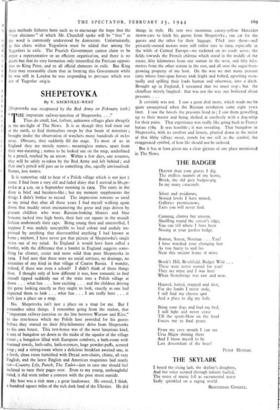SHEPETOVK A
By V. SACKVILLE-WEST
(Shepetovka was recaptured by the Red Army on February itch.) “THE important railway-junction of Shepetovka. . . ." Thus do small, lost, forlorn, unknown villages glare abruptly in the arc-light of The News. It is as though they had risen out of the earth, to find themselves swept by that beam of notoriety ; brought under the observation of watchers many hundreds of miles away. Obscure, they suddenly fill the stage. To most of us in England they are merely names ; meaningless names, apart from their war-meaning ; names to be looked out on the map, underlined by a pencil, marked by an arrow. Within a few days, one assumes, they will be safely re-taken by the Red Army and left behind ; and then one's pencil will pass on to something else, equally unvisualised. Names, just names.
It is somewhat odd to hear of a Polish village which is not just e. name. I find from a very old and faded diary that I arrived in Shepe- tovka at 4 a.m. on a September morning in noon. The entry in the diary is brief and business-like ; but my memory supplements the things I didn't bother to record. The impression remains so vivid in my mind that after all these years I find myself walking again down that muddy street encountering the geese and pigs driven by peasant children who wore Russian-looking blouses and blue trousers tucked into high boots, their hair cut square in the moujik fashion underneath their caps. Being young then and untravelled, I suppose I was unduly susceptible to local colour and unduly im- pressed by anything that disresembled anything I had known at home ; anyhow, I have never got that picture of Shepetovka's single street out of my mind. In England it would have been called a hamlet, with the difference that a hamlet in England suggests some- thing far cleaner, cosier and more solid than poor Shepetovka in 19o9. I feel sure that there were no social services, no drainage, no amenities of any kind in that village of Czarist Russia. I wonder, indeed, if there was even a school? I didn't think of those things then. I thought only of how different it was, how romantic to find oneself tipped suddenly out of the train into a Polish village at dawn . . . what fun . . . how exciting . . . and the children driving the geese looking exactly as they ought to look, exactly as one had expected them to look . . . what fun . . . I am really here . . . it isn't just a place on a map.
No. Shepetovka isn't just a place on a map for me. But I remember other things. I remember going from the station, that " important railway-junction on the line between Warsaw and Kiev," to the rest-house which my Polish host provided for his guests before they started on their fifty-kilometre drive from Shepetovka to his own house. This rest-house was of the most luxurious kind, a sort of bungalow set down in the midst of the squalor of the village street ; a bungalow filled with European comforts, a bath-room with warmed towels, bath-salts, bath-essences, huge powder-puffs, scented soap ; and a sitting-room where a delicious breakfast awaited one, in a fresh, dean room furnished with Dryad arm-chairs, chintz, all very English, and the latest English and American magazines laid neatly nut—Country Life, Punch, The Tatler—just in case one should feel inclined to turn their pages over. Even to my young, unthoughtful mind, it did seem rather a contrast with the poor street outside.
My host was a rich man ; a great landowner. He owned, I think, a hundred square miles of the rich dark land of the Ukraine. He did
things in style. He sent two enormous canary-yellow Mercedes motor-cars to fetch his guests from Shepetovka ; one car for the guests and the other for their luggage. Piled into these—and privately-owned motors were still rather rare in t00% especially in the wilds of Central Europe—we racketed on no roads across the fields towards the French chfiteau which stood in the middle of the estate, fifty kilometres from one station in the west, and fifty kilo- metres from the other station in the east, and all over the sugar-beet- growing property of my host. On the way we met many peasant carts whose four-span horses took fright and bolted, upsetting even- tually and spilling their loads human and otherwise, into a ditch. Brought up in England, I screamed that we must stop ; but the chauffeur merely laughed : that was not the way one bothered about peasants. . . .
It certainly was not. I saw a great deal more, which made me be quite unsurprised when the Russian revolution came eight years later. I saw the hovels the peasants lived in ; I saw them grovelling up to their master and being slashed at carelessly with a dog-whip for their pains. • That experience was really like going back to France before 1789. It was horrible ; it was revealing. That bungalow in Shepetovka, with its comfort and luxury, planted down in the midst of that filthy village street, stands for me still as the symbol, the exaggerated symbol, of how life should not be ordered.
But it has at least given me a clear 2icture of one place mentioned in The News.


























 Previous page
Previous page